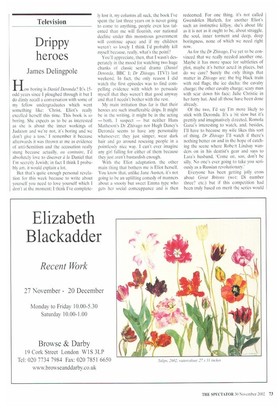Drippy heroes
James Delmgpole
How boring is Daniel Deronda? It's 15odd years since I ploughed through it but I do dimly recall a conversation with some of my fellow undergraduates which went something like: 'Christ, Eliot's really excelled herself this time. This book is so boring. She expects us to be as interested as she is about the inner workings of Judaism and we're not, it's boring and we don't give a toss.' I remember it because afterwards it was thrown at me as evidence of anti-Semitism and the accusation really stung because actually. au contraire, I'd absolutely love to discover a la Daniel that I'm secretly Jewish; in fact I think I probably am, it would explain a lot.
But that's quite enough personal revelation for this week because to write about yourself you need to love yourself which I don't at the moment: I think I've complete
ly lost it, my columns all suck, the book I've spent the last three years on is never going to come to anything, people even less talented than me will flourish, our national decline under this monstrous government will continue apace and if my children weren't so lovely I think I'd probably kill myself because, really, what's the point?
You'll appreciate, then, that I wasn't desperately in the mood for watching two huge chunks of classic serial drama (Daniel Deronda, BBC 1; Dr Zhivago, ITV1) last weekend. In fact, the only reason I did watch the first episodes was to find compelling evidence with which to persuade myself that they weren't that good anyway and that I needn't bother with the rest.
My main irritation thus far is that their heroes are such insufferable drips. It might be in the writing, it might be in the acting — both, I suspect — but neither Hans Matheson's Dr Zhivago nor Hugh Dancy's Deronda seems to have any personality whatsoever; they just simper, wear dark hair and go around rescuing people in a pointlessly nice way. I can't ever imagine any girl falling for either of them because they just aren't bastardish enough.
With the Eliot adaptation, the other main thing that bothers me is Eliot herself. You know that, unlike Jane Austen, it's not going to he an uplifting comedy of manners about a snooty but sweet Emma type who gets her social comeuppance and is then redeemed. For one thing, it's not called Gwendolen Harleth, for another Eliot's such an instinctive killjoy, she's about life as it is not as it ought to be, about struggle, the soul, inner torment and deep, deep boringness, none of which we need right now.
As for the Dr Zhivago, I've yet to be convinced that we really needed another one. Maybe it has more space tor subtleties of plot, maybe it's better acted in places. but do we care? Surely the only things that matter in Zhivago are: the big black train with red flags; the ice dacha; the cavalry charge; the other cavalry charge; scary man with scar down his face: Julie Christie in her furry hat. And all those have been done already.
Of the two, I'd say I'm more likely to stick with Deronda. It's a bit slow but it's prettily and imaginatively directed, Romola Garai's interesting to watch, and, besides, I'll have to because my wile likes this sort of thing. Dr Zhivago I'll watch if there's nothing better on and in the hope of catching the scene where Robert Lindsay wanders on in his dentist's gear and says to Lara's husband, 'Come on, son, don't be silly. No one's ever going to take you seriously as a Russian revolutionary.'
Everyone has been getting jolly cross about Great Britons (wot: Di number three? etc.) but if this competition had been truly based on merit the series would scarcely have been worth following. Of course I spat and fumed when John Lennon made the top ten, but it didn't stop me being carried along (until we got to the bit where he left the Beatles, anyway) by Alan Davies's plausible tribute. And the fact that Shakespeare is God didn't stop me deciding by the time Fiona Shaw had finished her well-intentioned hatchet job that he was barely fit to ghost a Jeffrey Archer novel.
What was most heartening about the series was that the debaters who took the most old-fashioned stance, selling their heroes on their merits and historical achievements, rather than their relevance to modern Britain, were generally the most persuasive. So it was that while Michael Portillo completely shafted Elizabeth by making out that she was a sort of cross between Tony Blair and Nelson Mandela, and while Lucy Moore torpedoed Nelson by virtually ignoring his naval engagements and setting him up as a passionate, big hearted romantic, Jeremy Clarkson's muscular, no-nonsense, this-guy-was-great-andthis-is-what-he-did approach pushed the rank outsider Brunel all the way up to number two. Maybe TV viewers aren't so immune to intelligent argument. after all.



























































































 Previous page
Previous page